After five years of pioneering and testing, Safisana opened its waste-to-energy plant in Ashaiman in 2017, the first one ever in West Africa. As co-founder and financial supporter from the very beginning, Aqua for All played a crucial role in Safisana’s success in Ghana. Managing Director of Safisana, Aart van den Beukel, looks back on the lessons learned after twelve years of cooperation.
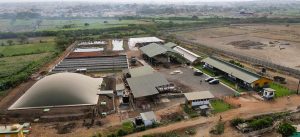
What prompted you as a Dutch entrepreneur to undertake such a grand mission of tackling the health problem in Africa?
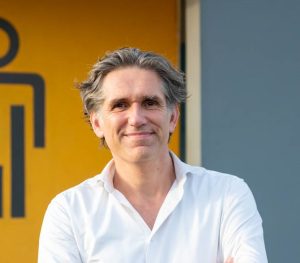
Well, to be honest, at the very beginning of Safisana, I was primarily concerned with the technical feasibility and with building an economically viable business case rather than the impact that it would generate on public health or the environment. We were not ready for that yet.
When Aqua for All and the other founding partners asked me in 2010 to set up Safisana and to run a pilot in Ghana for two years, I had never been to Ghana before, not even to Africa. But I remember being fascinated by the combination of technology and commercial opportunities. Working in Ghana can be challenging, because many aspects of society are rather unorganised, and informal. But that’s precisely where opportunities arise. There are much more possibilities compared to the Netherlands, for instance. You just have to be smart and find the right partners to play the game.
People often say to me: ‘What are you getting yourself into?’ when I tell them about my work. But as an entrepreneur, I like complexity. The more people say something is not possible, the more motivated I get to make it happen.
“The more people say something is not possible, the more motivated I get to make it happen.”
How did it all start?
When I started working on the pilot project, I knew from my previous work at the Dutch innovation company E-concern that it was possible to generate energy from human and organic waste. Organisations like Aqua for All and Wageningen University were also exploring the concept. But a recycling plant like ours did not exist yet. Yet visiting the country convinced me that it could be possible to apply the concept locally. There was a lot of waste, no sewage system, and a need for energy/electricity and manure.
How did you get the first funding?
From the beginning, I was surrounded by people who believed in the Safisana concept as much as I did. One of them was Sjef Ernes, Aqua for All’s former Managing Director. He had contagious positivism and unbridled energy. Aqua for All and four other parties, including Rabobank and Wageningen University, were prepared to take the risk and invest €50,000 euros each for a small-scale pilot to prove the concept in a peri-urban area.
With the help of a local contact person, we searched for a location in one of the suburbs of Accra. That is how we ended up in Ashaiman, a community of 250,000 people without proper sanitation and sewerage systems. We built a toilet block and a small dome digester for the biogas production process through the anaerobic digestion of faecal and organic waste. We also did all kinds of studies on what to do with the biogas produced, like generating electricity or using it to fuel cars, because feeding it into the grid – as we do now – was legally impossible back then.
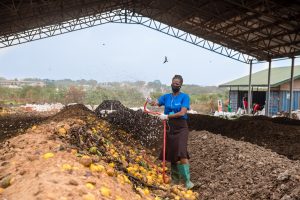
In all these years working for Safisana, what have been the most challenging and gratifying moments for you?
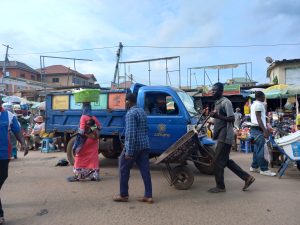
Well, it hasn’t been all that easy. After the pilot, we realised we needed more money and time. It became clear that the technology would only work properly if it would be applied on a larger scale. But the chance of success was anything but certain yet. Nevertheless, the partners kept on believing in the concept. With their moral and financial support, we were able to convince other funders to join.
In 2013 and 2014, we were granted €1.1 million from the African Development Bank (AfDB), which was enough to receive match funding from the Sustainable Water Fund of the Dutch Ministry of Foreign Affairs. Now we could go ahead and build a large-scale pilot: the current factory in Ashaiman.
Of the ten projects that received AfDB funding at the time, we are the only initiative still standing. The introduction of the Renewable Energy Act in Ghana in 2011 was a major turning point for the plant’s development as it allowed us to supply electricity back to the grid. In fact, we are still the only waste-to-energy company in Ghana with an official Power Purchase Agreement with the national electricity company ECG. We are very proud of both achievements.
Today, seven years after its opening, Safisana Ghana Ltd. is a locally-run company that employs 40 men and women and is fully embedded in the community. We collaborate with around 200 local SMEs, ranging from market women at the food markets, public toilet operators, truck drivers transporting faecal sludge to us, and farmers purchasing our fertilizer. In total, we serve over 80,000 people with cleaner, healthier living and working environments and improved social and economic conditions thanks to our waste treatment services and the provision of renewable energy and organic fertilizer. And we are just getting started.
How do you see Safisana in ten years?
Our biggest ambition for the coming ten years is turning our circular model into a standardised solution to the many health, climate, energy and food-related challenges in developing countries. The lack of proper sanitation and waste treatment services is still killing hundreds of thousands of people each year.
“Our biggest ambition for the coming ten years is turning our circular model into a standardised solution to the
many health, climate, energy and food-related challenges in developing countries.”
To accelerate the scaling, we have realised that we need to look beyond governments and engage large food processing industries. Many of them have very ambitious sustainability targets for the coming decade to reduce their footprint with zero-carbon-emission- and zero-waste-to-landfill policies. Speaking of opportunities, this is definitely the biggest one for the coming years.
What would you say/advise entrepreneurs with a similar idea to take into consideration?
You must have patience and staying power. Developing projects like ours takes time. The market is uncertain. Financing is uncertain. If you look at the sanitation and water sector, profitable commercial businesses hardly exist. All programmes are subsidised.
We initially assumed a rate per ton of waste treated, but governments in low-middle income countries do not have the resources or the awareness and willingness to put waste treatment high on their agendas. Our short-term goal is to break even by covering the operational costs, including maintenance, with the income from the sale of energy and fertilizer. For scaling up, we still depend on our loyal donors, to which Aqua for All belonged for many years.
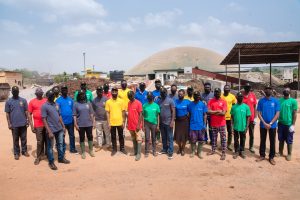
My main lesson is: perseverance pays off. The call for circular solutions has never been more urgent. Climate crisis, energy crisis, fertilizer shortage – five years ago these were not an issue. Now the newspapers are full of them every day. Ironically, this gives us the wind at our backs. We are now working towards a commercial model in which we work together with existing donors to attract other investments from public and commercial parties. To deeply impact people’s health and the environment, we are committed to building many more Safisana plants in Ghana and across the African continent.
This is the first story of the series “We are Safisana!”, which will be published in two parts. Part 1 includes two stories that were produced in collaboration with Safisana. Part 1 will be published on Aqua for All’s website. Part 2 will be published on Safisana’s website.
Read the interview with Gloria Annor, Plant Supervisor at Safisana.